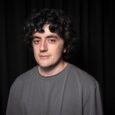Veton Nurkollari, or xhaxhi (uncle), as he is affectionately called by many, is resolute about the activist spirit of Dokufest. An international documentary and short film festival he co-founded 24 years ago in Prizren, at a time when the city had no functioning cinema in the aftermath of the Kosovo war, Dokufest has emerged as one of the most important film festivals in southeastern Europe, having become a qualifying-festival for the BAFTAs and the European Film Academy.
This year’s 24th edition was launched under the slogan, “Mental Greed Endless Void,” a departure from the more optimistic calls to arms for which Dokufest has become known. Whether it’s reclaiming public spaces for the citizens of Prizren, tackling corruption, or advocating for environmental protections, Dokufest has a long tradition of using its platform to promote change.
In light of the festival’s history, this year’s edition is a shift in tone, a bleak assessment of current affairs. Tapping into the zeitgeist, the theme tackles the numbing aftereffect of trauma, whose images we have become so accustomed to consuming in light of the ongoing genocide in Gaza. Alongside their programme of films, the festival organised a series of talks, panels and Q&A sessions to discuss and question the ethics of documentaries at a time of generalized apathy and pessimism, an existential prompt for a festival that promotes activism through cinema.
Despite the somber tone of the theme and the world at large, Nurkollari remains committed to the festival’s spirit of activism in a climate where, across Europe, the censorship of cultural organisations abounds. Where expressions of solidarity with Palestine have led to deplatforming, a phenomenon that has exposed the limits of expression in European art institutions, Dokufest has bucked this trend. Uncompromising as ever, this year’s edition drew links across various struggles from Gaza to Ukraine.
K2.0 spoke to Nurkollari, the Artistic Director of Dokufest, in the festival’s offices, which were abuzz with young volunteers. We explored the magic of cinema and the efficacy of activism in the face of censorship, pessimism and despair. Set against the backdrop of this year’s theme, we discussed our collective responsibility at a time when Israel’s assault on Gaza rages on, as Russia continues its invasion of Ukraine and the tide of the far-right swells across the globe.
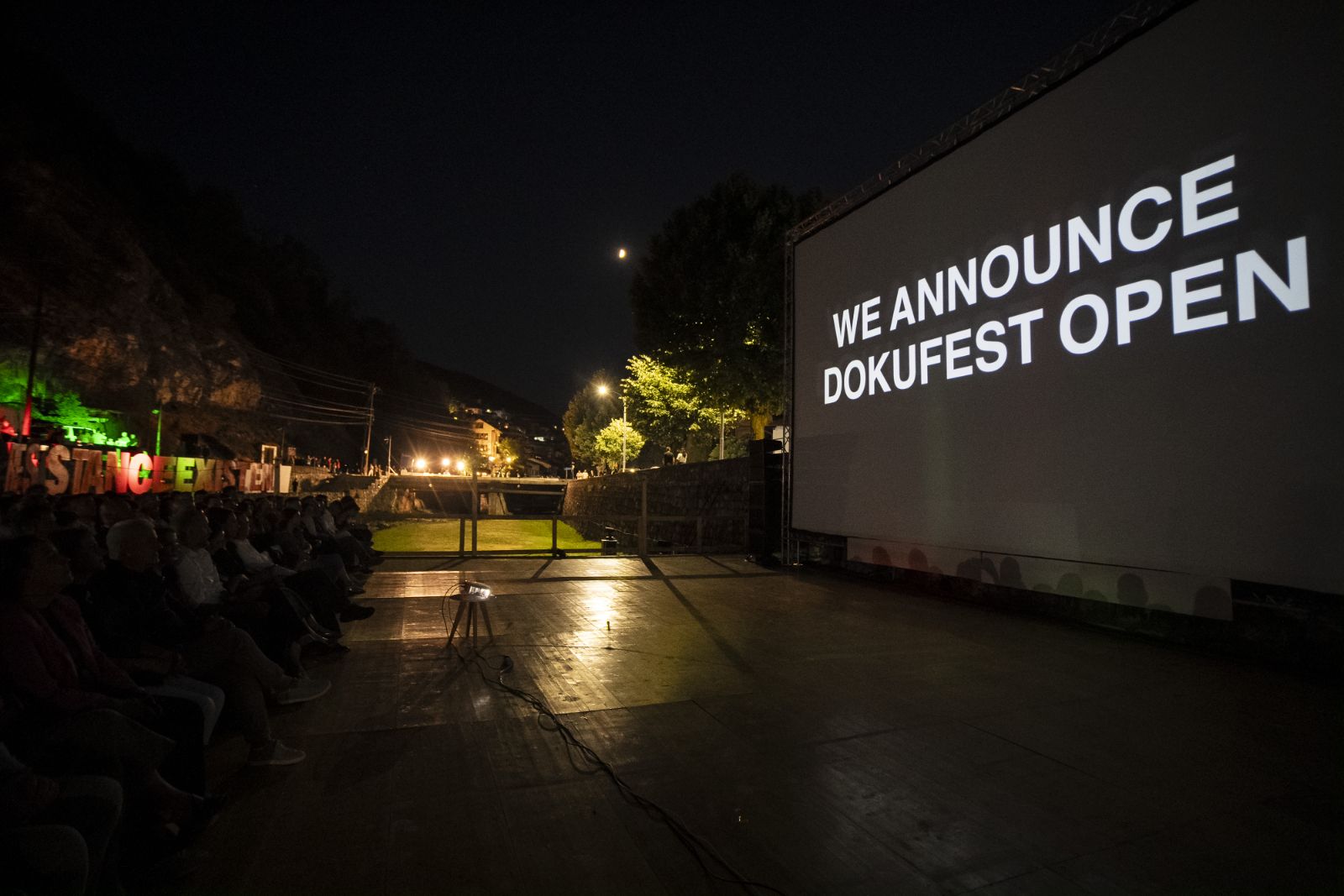
K2.0: I read in Dokudaily that you were nervous about launching this year’s theme. Can you tell us why?
Veton Nurkollari: I mean, maybe ‘nervous’ is not the best word to describe it. We were sort of helpless. You know, the choosing of the theme is an interesting thing here, and it takes some time, quite some brainstorming sessions, talks. This year was a bit more difficult, actually, much more difficult, because we felt helpless. I think it is reflected in what we’ve chosen to put forward, words; we’ve even tried to explain that it’s not really a theme. It’s more like – when you go to a doctor and the doctor gives you a diagnosis, so, more of a diagnosis of something seen and felt, that we’re unhappy about.
We were concerned because we were helpless. I think it’s not only us; it’s a state that quite a few people around the world feel. How, what does it mean to be helpless? You see a lot of bad things going on, and there’s very little you can do.
This was probably why we were so worried, concerned, and why it was so difficult. I said it was probably the most difficult year to put something [forward], to try to make a discussion around it and initiate some talks, find some answers, but it wasn’t the best year to come up with something that people expect from us while we [felt] helpless. So I think it resonates, somehow, but it was not so easy to come up with.
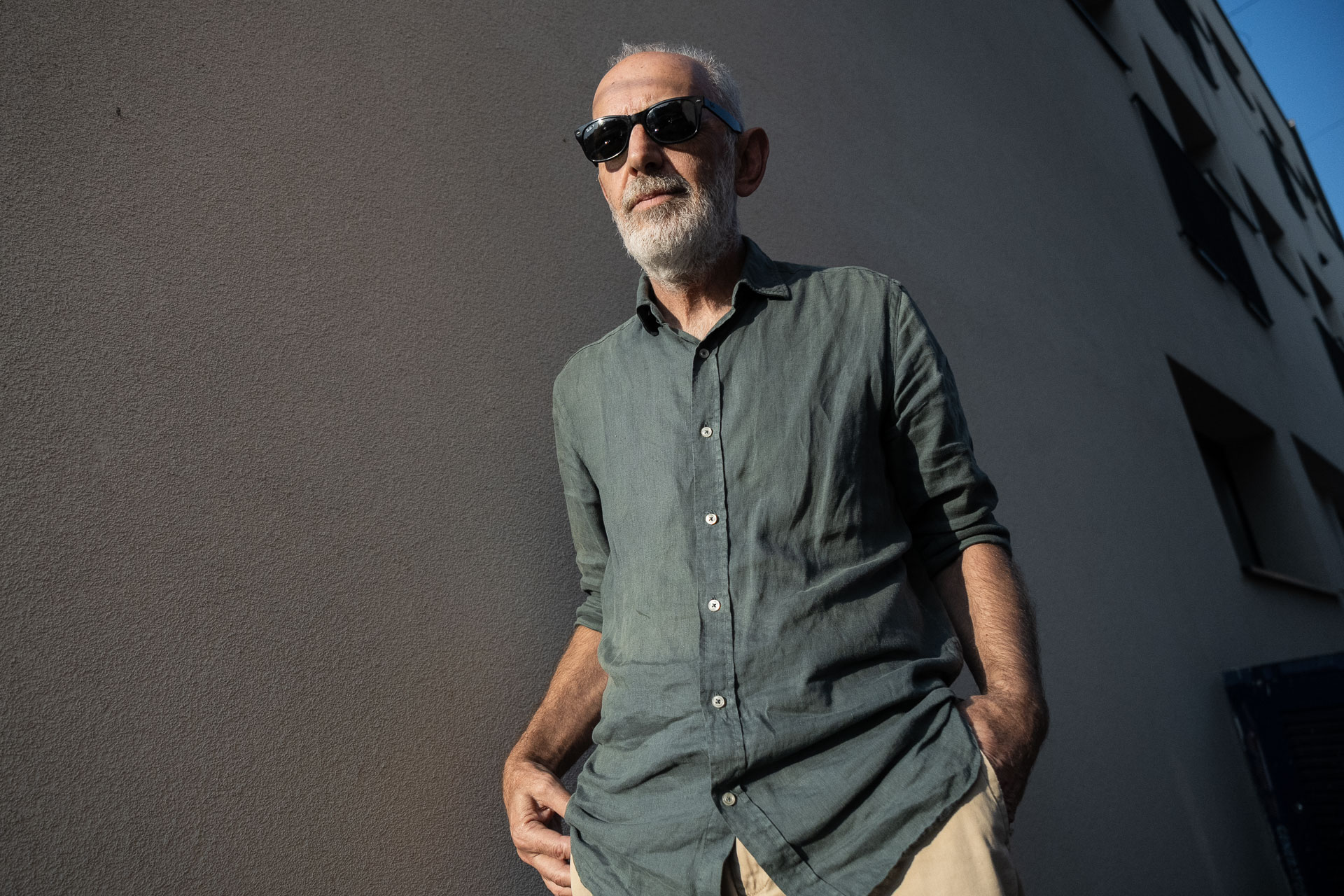
I had thought this year’s theme sounded diagnostic, and that last year’s one seemed diagnostic as well: a ‘new order’. But this year, especially, seemed like a bit of a departure from the more optimistic slogans we’ve become familiar with from Dokufest. Did your reservation stem from this shift in tone?
Nurkollari: I mean, again, last year was not really diagnostic as much as, maybe, a prediction. That there is something on the horizon, somewhere, some sort of new order is coming, and we were sensing it.
We didn’t really [think] that it would come this fast and this violently. I mean, it is a shift, as much as the shift is happening around us. What we noticed is that this shift has accelerated too much and too fast. Instead of second gear, I feel like someone has put it in fourth or fifth gear. Everything is moving super fast; these shifts are happening so quickly and very often, unexpectedly. Even if we expect it, it’s bigger, uglier, more violent.
The optimistic slogans and tones from a couple of years ago are shifting to something darker. I hope it's momentary.
This shift that you’ve mentioned and that you’ve noticed is, of course, there, and we had to react to it somehow. The optimistic slogans and tones from a couple of years ago are shifting to something darker. I hope it’s momentary. I hope this shift happens in some more progressive way. I don’t know, at the moment, I feel, I think, it’s not only my feeling, that the world is in some sort of free fall. Where it will hit, how big it will be, and what will come out of it, I don’t really have that sort of ability to predict. But our mission is to do something.
You know, being a documentary film festival, showing so much stuff from all over the world, some difficult films from parts of the world that are experiencing horrors, you cannot pretend to make it shiny and bright and beautiful. It’s just not in our mission.
We invite whoever attends the festival, filmmakers and thinkers, to contribute to discussions. It’s part of what we do. We’re not a red carpet, shiny festival type of thing. It’s a serious festival with a mission in the background, and it’s our obligation. We’re just doing as much as we can to, I don’t know, I think it’s a big word to say educate, but to warn, or to show, through film and through discussions, what’s going on.
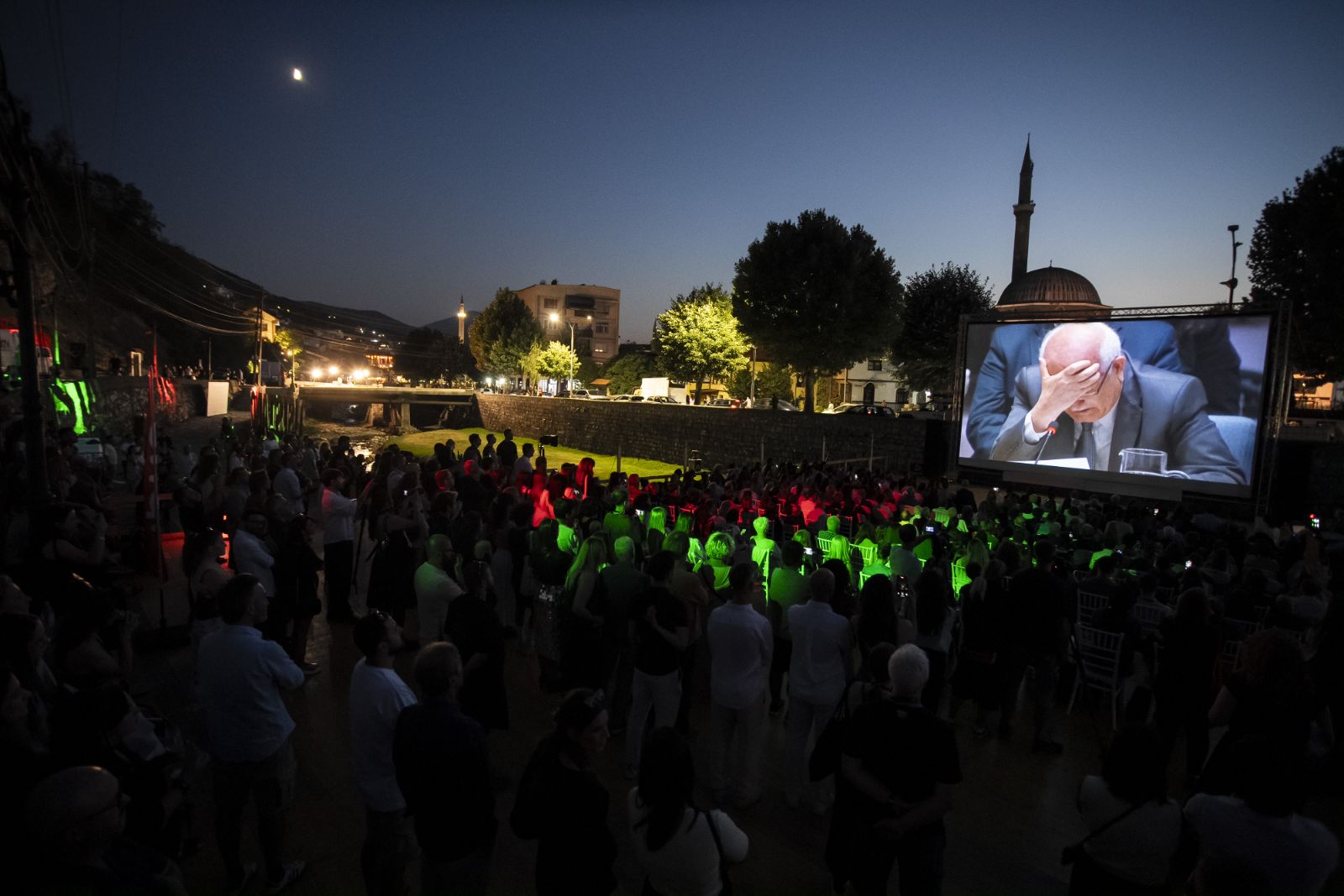
Did this theme seem like a contradiction or seem too pessimistic in light of Dokufest’s commitment to activism? Is that why you were nervous about it?
Nurkollari: I mean, to be honest, it’s not that I was nervous; I was much more worried. And also, I felt numb to all the silence, to all the turning heads, even when you see something – it’s becoming too common to sort of hush-hush – don’t talk, it may be bad for you.
And we’ve been seeing this across the world, in Europe, that it’s somehow beneficial to keep your mouth shut, to not take a stance, or on some occasions, to take the wrong stance instead of the right one. Maybe the theme or these words may sound contradictory to activism, but we are still an activist festival.
You know, we had an opening ceremony, instead of, again, shiny speeches, we decided, no speech. Instead, 15 minutes of newsreels and some clips from the films, assembled by Leart Rama, [filmmaker and Dokufest videographer,] together with [the team], to scream, somehow, to all the people present. We knew that there’d be some politicians there, some embassy representatives, some businessmen, people who turn their heads when they need to see, to kind of force them.
Our message was that we don't turn our heads [away] from what is happening in the world.
I think it’s part of the activist spirit of this festival; instead of putting slogans here and there, you use the platform, you use whatever you have to send a message. Our message was that we don’t turn our heads [away] from what is happening in the world. Mostly it was Palestine and Gaza, but not only. We brought a band from Ukraine, [DakhaBrakha,] we showed a couple of great films from Ukraine, including [“Special Operations”], shot by CCTV cameras, when Russian troops entered Chernobyl. A stunning example of a documentary with not a single word in it. Again, forcing us to watch and draw conclusions.
So, I mean, I don’t think that we’ve shifted [away] from activism. Maybe it’s changed a bit. Instead of, as I said, putting slogans up, we’ve used other tactics. It’s in the spirit of this festival, and it’s in the spirit of what we’ve been doing for many, many years.
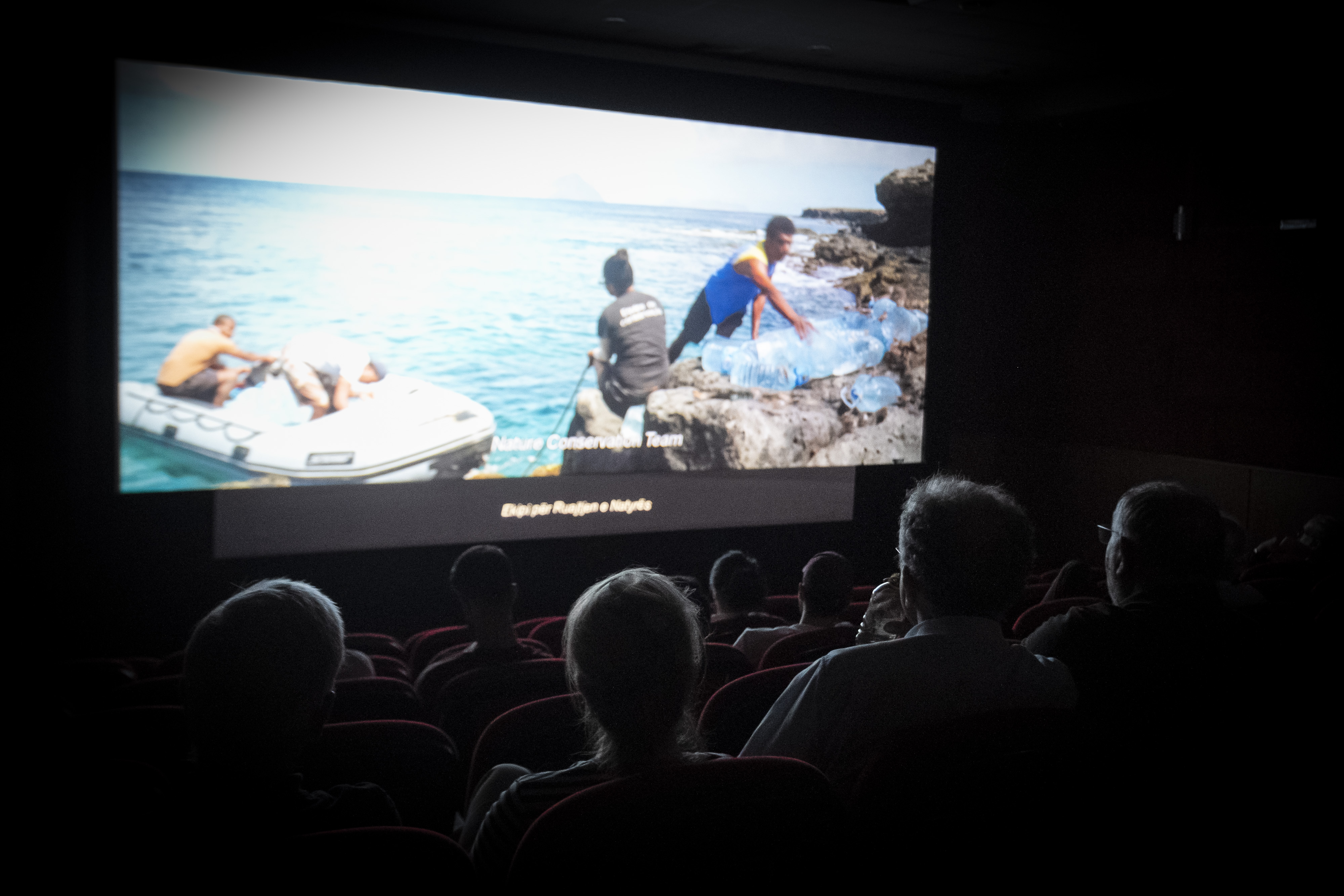
The theme also seems to question what effect there is in bearing witness to suffering. What do you think it means to watch documentaries today in light of the genocide in Gaza, which continues despite being live-streamed and so well-documented?
Nurkollari: I see and watch a lot. So I have my own kind of mechanisms. Not stay numb, but I’ve seen enough that I’m not so easily shocked. But this only says something about me, not about the festival or the theme.
When we were playing and brainstorming [the theme], we kind of got to the word greed, which opened us up a lot more. Because we realized that greed is actually some sort of invisible driving thing or force for so many bad things that are happening. You know, Israel is taking over Gaza and not only Gaza, [but] part of Syria, out of greed. It’s not what they’re trying to explain to the rest of the world, that it’s because of October 7. They want the land and its greed.
There’s a huge greed at the top of the financial world. I mean, a few greedy billionaires are now running the world. This greed is a cause for suffering. So, when we were playing with the words, we realized that there’s, you know, this big, almost like some sort of dark matter thing called greed. And it’s endless. It’s not small. It seems like it’s the greed of a few rich people or some crazy Israeli politicians or Netanyahu, but actually, it’s bigger. It’s like some cancer spreading to common people.
I think we also have some responsibility. Me and you and the people who come to see the films here, the people who watch. Why are we allowing this?
The first word that we started playing with was mental, as some sort of diagnostic thing, but we realized the problem is bigger. It’s not only the state of mind of a few crazy people, because Nentenyahu is mental, Trump is mental, because Modi is mental, and Putin is mental. But then it felt like we were throwing the guilt onto a few crazy people [with this word] – but what about us?
I think we also have some responsibility. Me and you and the people who come to see the films here, the people who watch. Why are we allowing this? Why is Germany so contradictory? Why is Israel so okay with genocide? These were the questions that were bothering us.
I wonder what you think it means to watch documentaries during this time?
Nurkollari: For me, watching documentaries becomes more and more important every day. I’d like to say that I’ve learned through the festival and watching, much more than at university. It’s as if I graduated from, I don’t know, four different faculties. Learning about the environment, learning about human rights and watching films about ordinary people, for me, it’s getting more and more important, especially in this troubled time.
For example, I was in Belfast, a pretty troubled place, and I saw some Irish films which were amazing. Not really about the past or conflict, but about ordinary people. It feels amazing to be able to discover these kinds of stories and these kinds of films about places, [we] often [have] preconceived notions [about] and it’s not really exactly as you think it is, and then you discover something beautiful. That’s probably one of the great things that I keep on discovering. Things, people, and places through watching documentary films. I think it’s an incredible gift.
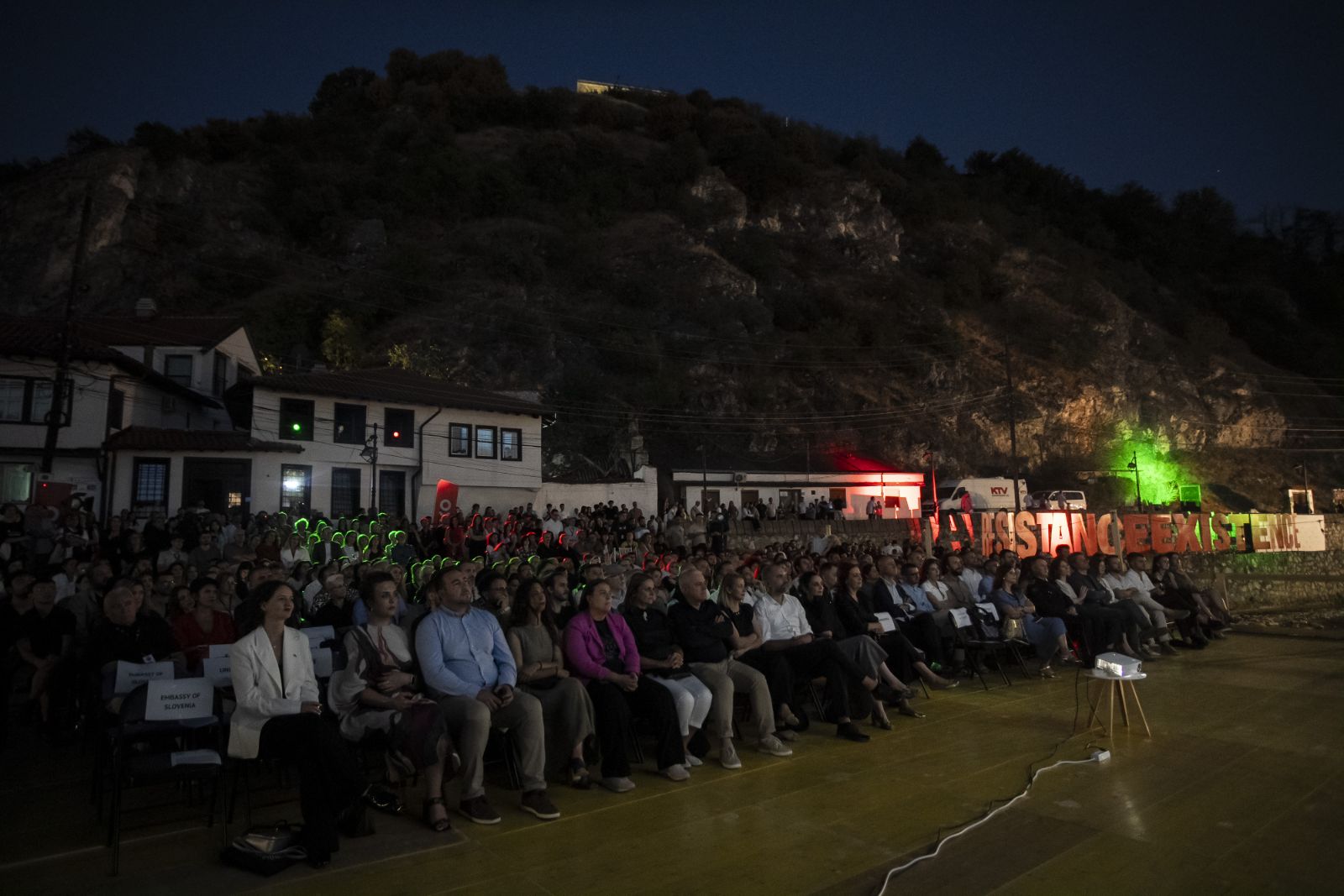
What effects do you think the advocacy of the festival has had on the social and cultural life of Prizren? Oftentimes, festivals are justified by their economic impacts, the boost they provide to local businesses. But, I’m curious as to what other effects you think this festival has had on the city, Kosovo, or the region?
Nurkollari: Maybe the best example would be the initiative to protect Lumbardhi Cinema, to convince the authorities to put it under protection. I think the success in getting 57 civil society organizations on board for the same cause to protect the cinema. First, from destruction, and second, from [privatization], then advocating for enlisting it in the list of cultural heritage sites. And in the end, as a site that needs support for restoration.
Armata cinema and Kino Rinia in Prishtina, Anibar cinema in Peja, took a similar course. I think it’s good because it shows that through activism and through advocacy, you can reach goals. It’s probably one of the very rare and few examples of a successful campaign in all of the Balkans. Because there are so many similar stories of cinemas or public spaces that are either sold for little money or left in ruins because there are no mechanisms or no efforts. We showed that with a bit of effort and a bit of support, you can actually put forward some sort of noble cause and succeed. I think the Dokufest has been instrumental in a few other things, but I would say that.
Dokufest is often contrasted against the more conservative attitude of Prizren, but I’m interested to know whether there have been conflicts with your donors and with institutions that sponsor the festival. Have there been moments where your advocacy has come up against their interests or values? I’ve noticed that, for example, the American Embassy is not a sponsor of the festival anymore.
Nurkollari: That’s a good observation… I don’t know why. But yes, the answer is yes, not on a big scale. For example, we lost a sponsor in the year we made corruption a theme. I think it was such a, I don’t know how to put it, to some misleading theme, as if we are accusing everyone. And some recognized themselves [in it] without us pointing the finger. We even got a phone call from the higher levels of government [asking] why there was a need to put such a blatant theme? So we did lose something, but I think we gained more. Not sponsors, but we gained trust in ourselves.
Sponsors can leave; we can try to find others with as little compromise as possible.
Sponsors can leave; we can try to find others with as little compromise as possible. I mean, I’ve been asked a lot about the sponsors, how much a sponsor affects [us]. We’ve created some red lines that we tend not to cross. One is, for example, we don’t take a film from a sponsor. It’s a red line. If you’re a big sponsor, you’re the CEO of a sponsor and your son is a filmmaker.
One of the big values of this festival and the thing that we’ve invested in a lot is programming, what we show, why we show and we should not compromise that. I mean, of course, every sponsor comes and most of them ask [for] something, but we’ve learned the craft. To please them, but to still do what we want. I think that’s another great thing [about] the festival, to be able to do what we want to do without really compromising too much.
We do lose [sponsors] sometimes, and I have no idea, to be honest, what we did wrong, but we must have done something wrong, that the American embassy silently stopped.
Alongside the year’s theme, there was a glossary of terms – magic, rebel, build – to help counter this overwhelming feeling of dejection. Do you have particular films in mind from this year’s program that drew on the spirit of these words?
Nurkollari: It was a bit of a counterbalance, in a way, coming up with some sort of vocabulary, a spirit, and not [just] these four words [“Endless Greed Mental Void”] that again seemed so gloomy and so depressive.
There was a film that a lot of people walked out of the cinema saying, oh my goodness, what a film. It was a film about an actor, actually, it was a film about America today, called “Henry Fonda for President”. A brilliant, three-hour essay about this great actor, his movies, clips from his movies and clips of America. Such a divine, glorious film explaining the state of mind in America, if I can put it bluntly, through a love of cinema.
So we [wanted] with these words to also bring some love for cinema and cinema itself as a medium and why we do what we do, because we are all, somehow, indebted to cinema.
Were there any discussions, either in the Q&As or panels, that have stuck with you?
Nurkollari: There have been so many things at the festival, like a masterclass by Igor Bezinovic, this Croation filmmaker, explaining how he shot his film called “Fiume O Morte,” about the occupation of the city of Rijeka by an Italian poet and fascist [Gabriele D’Annunzio], it so brilliantly explains things that are happening there now. The talk with him later, [where the audience felt the] need to ask advice, because they want to fight for their city of Rijeka, because there is a wave of fascism coming. I could feel how worried they were. It was a very nice talk.
Last night I attended a deliberation for a youth jury, which was wonderful. To hear more than 10 young people from Kosovo and Serbia discussing films. Honestly, it was better than many juries I have been on.
A screening last night, [Through Our Kosovo] with music by the Lumbardhi Assembly led by Ilir Bajri. And then the film about Prishtina’s music scene, [“Palace of Youth”]. I think these were special moments; people were so enthusiastic and happy.
Next year is the 25th anniversary of Dokufest. How are you feeling about this milestone?
Nurkollari: I think we are already looking forward to it. We never imagined there would be 25 years of anything, let alone a big festival, so we’re already playing with some ideas. We will probably do 25 films from 25 years. I’m already excited, which 25 films? There are 250 I like. We never start talking about the next festival before [the current] one ends. We’ve already started talking about the next one. I think it will be a special one. I hope that it will. And yes, I think it is a cause for celebration. So we want and we hope that we will celebrate it. And I hope that the situation will be at least a bit better than it is now. More hopeful than depressive.
This article has been edited for length and clarity. The conversation was conducted in English.
Feature Image: Ferdi Limani / K2.0

This article was published with the financial support of the European Union as part of the project “Diversifying voices in journalism.” Its contents are the sole responsibility of Kosovo 2.0 and do not necessarily reflect the views of the European Union.
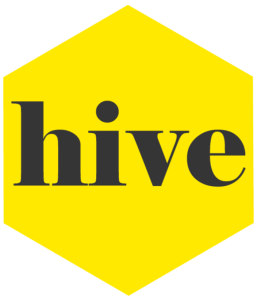 Want to support our journalism? Become a member of HIVE or consider making a donation. Learn more here.
Want to support our journalism? Become a member of HIVE or consider making a donation. Learn more here.







